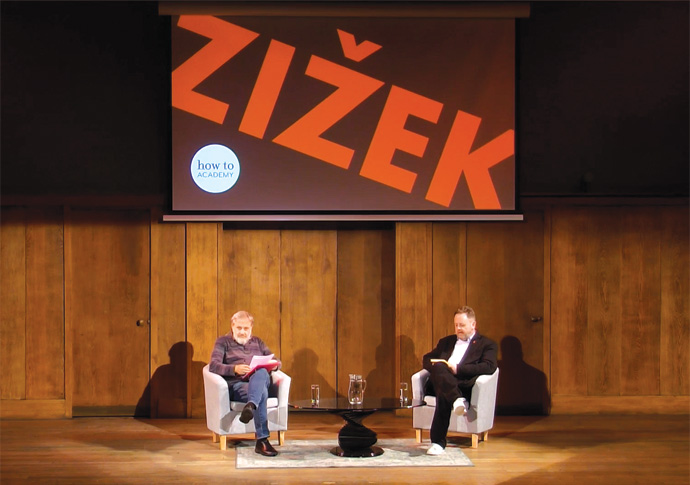Apocalypse now!
The only way to deal with today’s crises is to assume they’ve already happened, says Slavoj Žižek. Anna Lamche reports
Thursday, 16th November 2023 — By Anna Lamche

Slavoj Žižek, left, at Conway Hall
THE time is five past midnight on the Doomsday clock. Holborn is under water, Hampstead sits on the coast. Temperatures have risen rapidly, resources are scarce and the world is at war. “Generalised disorder” reigns.
This was the future into which the “philosophical rockstar” Slavoj Žižek asked his audience to project themselves during his recent talk at Conway Hall.
The Slovenian cultural theorist was there to discuss his latest book, Too Late To Awaken: What Lies Ahead When There is No Future? There was standing room only for the talk, moderated by journalist and author Matthew d’Ancona.
Mr Žižek told the audience we are currently living through an “apocalyptic situation”, defined by the concurrent threats of “nuclear war, ecological breakdown, global economic and social chaos, Russia’s attack on Ukraine exploding into a new world war”.
Against this backdrop, Mr Žižek argues “the only way to prevent a catastrophe is to assume that it’s already happened – that we’re already five minutes past zero hour”. Assuming a crisis has already occurred allows us to reflect on what we might have done differently, Mr Žižek said. As he writes in his book: “We can then act on these possibilities today.”
His conclusions are deliberately provocative. He sees in each crisis – the threat of war, ecological breakdown, social chaos – a moment in which “incredible things can happen”.
As Mr Žižek told the audience, it is possible to find “hope” in the “apocalypse” through which we are currently living. For the philosopher, only one thing is certain: “The greatest risk today is doing nothing and allowing history to follow its course.”
Taking Donald Trump’s response to the pandemic as his example, he told the crowd: “Trump, not my favourite guy, but remember what he had to do during the epidemic? Every family got a cheque for $2,000… this was a communist measure in the simple sense that a concern for welfare of the [people] led even Donald Trump to do things which really violate all the market rules.”

Slavoj Žižek [Amrei-Marie / CC BY-SA 4.0]
He added: “This gives me hope. We can afford methods which are, from the ruling market ideology, a catastrophe, and we can survive it.”
As he writes in his book, each crisis should be understood in a “positive way”. This is what Mr Žižek describes as “war communism” – an attitude that treats crisis “not just as an obstacle but as an incentive for a general reorientation of our economy and social life”.
As an example of “war communism”, Mr Žižek cites the rationing of cooking oil in the UK following the outbreak of war in Ukraine. He writes: “More measures of this kind may well become the only way to survive.”
Mr Žižek rejects the modern idea of progress, sometimes described as the Whig interpretation of history, arguing instead that we have entered into a new age of great-power rivalry and resource scarcity.
Theoretically, it is all very well to find “hope” in moments of crisis. But in practice, as we witness the horrors of war and the scale of ecological destruction across the globe, it can be difficult to find anything to reassure us.
But Mr Žižek – introduced on Friday as “the bad boy of philosophy” – seeks to provoke and push his audience. Many of his ideas are unpalatable: for example, he concludes we will have to “violate not only the usual market rules but also the established rules of democracy (enforcing measures and limiting freedoms without democratic approval)”.
Ultimately Mr Žižek’s book must be read in the spirit in which it was written. Too Late to Awaken is a wide-ranging, if mischievous, work of philosophy that brings urgency and insight to debates about the future. But perhaps the philosopher, a self-described Communist, should aim higher: after Marx, “philosophers have only interpreted the world, in various ways. The point, however, is to change it.”
Mr Žižek noted we live in “cynical times” in which “the way we criticise the system is part of the system.” He said: “Today’s formula is, ‘we know what we are doing, but nonetheless we are doing it’.”
The irony must not have been lost on Mr Žižek, who delivered many of his “provocative trigger warnings” with trademark intensity, performing for an audience who had bought their tickets for £30 each, spent £9 on a glass of wine at the bar, and splashed out £20 on a copy of his latest book before filing out into the cold.
• Too Late to Awaken: What Lies Ahead When There is No Future? By Slavoj Žižek, Allen Lane, £20
